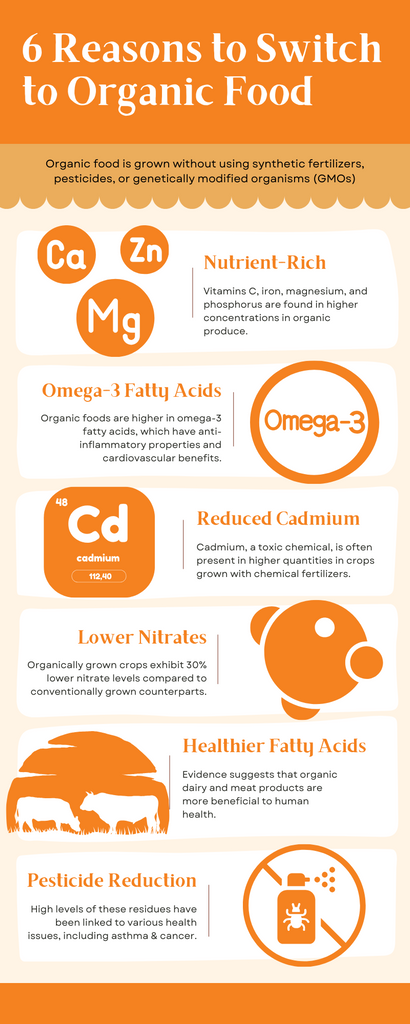6 Reasons to Switch to Organic Food
| March 26, 2024
In recent years, the availability and affordability of organic food have significantly increased, making it a staple in many households. But what exactly is organic food, and why should you consider making it a part of your diet?
What is Organic Food?
Organic food is not just a label but a promise to support agricultural practices that prioritize sustainability and environmental health. As per the United States Department of Agriculture (USDA), organic food is grown without using synthetic fertilizers, pesticides, or genetically modified organisms (GMOs). Natural methods are used to increase soil fertility, combat pests, and increase biodiversity in organic farming1.
The Benefits of Going Organic
Nutrient-Rich Organic Food
Numerous studies have compared the nutritional content of organic and conventionally grown food. The findings consistently highlight that organic food is richer in essential nutrients. Vitamins C, iron, magnesium, and phosphorus are found in higher concentrations in organic produce. Additionally, organic food boasts elevated levels of phytochemical antioxidants2.
Omega-3 Fatty Acids: A Vital Component
Organic foods are higher in omega-3 fatty acids, which have anti-inflammatory properties and cardiovascular benefits. A study revealed that milk from organically raised cattle contains increased amounts of omega-3 fatty acids, contributing to improved heart health and reduced risks of diseases like diabetes and arthritis3.
Reduced Cadmium Levels
Cadmium, a toxic chemical absorbed by plants from the soil, is often present in higher quantities in crops grown with chemical fertilizers. This element can have detrimental effects on both human health and the environment. Organic food, on the other hand, demonstrates significantly lower levels of cadmium4.
Lower Nitrates in Organic Crops
Studies have indicated that organically grown crops exhibit 30% lower nitrate levels compared to conventionally grown counterparts. This reduces the risk of certain cancers, making it appealing to health-conscious consumers5.
Healthier Fatty Acids in Organic Dairy and Meat
Evidence suggests that organic dairy and meat products are more beneficial to human health than conventionally produced options. This is because they contain higher levels of important nutrients like omega-3 fatty acids, iron, vitamin E, and carotenoids6. In fact, a comprehensive study conducted on 67 researches shows that organic meat contains lower levels of saturated fats compared to non-organic meat7.
Pesticide Residue Reduction
One of the primary concerns with conventionally grown food is the presence of pesticide residues. High levels of these residues have been linked to various health issues, including asthma and cancer. Opting for organic food significantly reduces exposure to pesticide residues.
Health Benefits of Organic Food
Anti-Inflammatory Effect
Chronic inflammation is the main cause of various diseases, including cancer, heart disease, and stroke. Organic food has demonstrated an ability to mitigate inflammation, reducing the concentration of proinflammatory compounds and promoting overall health.
Detoxifying Properties
Certain organic foods, particularly leafy greens, have been shown to aid in the body's detoxification process. This includes neutralizing free radicals and modifying urine pH to facilitate the elimination of harmful substances.
Antioxidative Effect
Organic food is rich in antioxidants such as lutein and beta-carotene, which play a crucial role in reducing the risk of diseases triggered by oxidative stress. By neutralizing reactive oxygen species and regulating immune system actions, organic food contributes to lowering the concentration of proinflammatory cytokines, positively impacting conditions like cancer and chronic hypertension8.
The Bottom Line
Organic food is not just a trendy choice for health enthusiasts; it offers many benefits that contribute significantly to overall well-being. Organic food has anti-inflammatory, detoxifying, and antioxidative effects, which are crucial for maintaining good health. Choosing organic options reduces exposure to harmful substances like pesticides and provides a nutrient-rich alternative that may help prevent chronic diseases.
- Choosing a selection results in a full page refresh.
- Press the space key then arrow keys to make a selection.

